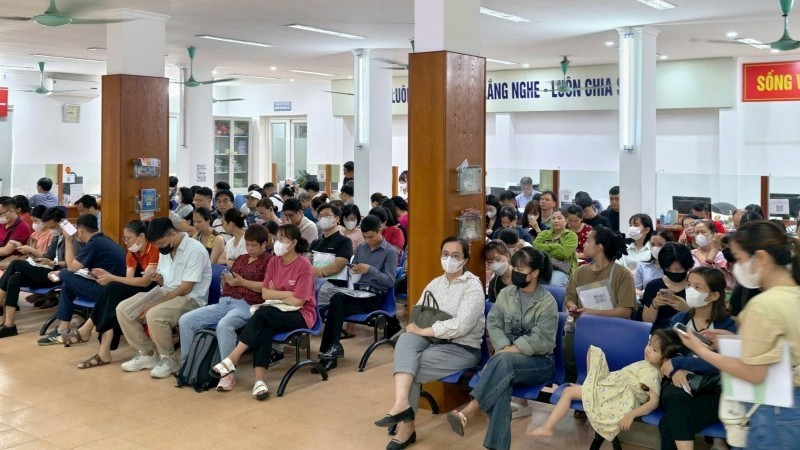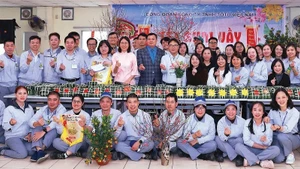Preventing workers from opting out of the social security system is now an urgent issue, calling for solutions in policy, market access, and social responsibility.
High demand for employment
27-year-old Hoang Yen Nhu, a graduate in Linguistics from the Academy of Journalism and Communication, was waiting to submit her application for unemployment benefits at the Ha Noi Employment Service Centre.
Yen Nhu previously worked for a private technology company in Ha Noi. When a division of the company was dissolved, she was one of dozens of employees laid off. Her previous job earned her 12 million VND (460 USD) per month, just enough to cover household expenses and pay for her child’s private kindergarten. But since becoming unemployed, her family’s circumstances have deteriorated.
“I thought about withdrawing my social insurance in a lump sum. But after some research, I found I wouldn’t get much because I had only paid contributions for 40 months. Since losing my job, I’ve stopped contributing,” Yen Nhu admitted.
47-year-old Nguyen Thi Mai Lan is another woman struggling to make ends meet after losing her job. Formerly the chief accountant of a company that dissolved in May 2024, she was instructed to finalise her social insurance record in February 2025 and was directed to the Ho Chi Minh City Employment Service Centre to apply for unemployment benefits. A single mother raising an 11-year-old child and caring for her bedridden mother, Mai Lan had hoped the unemployment allowance would provide temporary relief. However, with debts exceeding 480 million VND (18,300 USD), the pressure continues to mount.
“I want to withdraw my social insurance in a lump sum. I know I’ll lose out on future benefits, but if I don’t resolve the present difficulties, life will be unbearable. Jobs are hard to find now because I’m older and not as flexible as younger workers,” she said.
Another case is 39-year-old Vu Xuan Yen in Ho Chi Minh City, who used to work for a foreign-invested company in former District 1. After the company went bankrupt, she became unemployed, became pregnant, and gave birth. Her child is now seven months old. Having contributed to social insurance for five years and four months, she is applying to withdraw it in a lump sum due to financial hardship.
“If I withdraw, I’ll get over 100 million VND (3,800 USD). That amount could support my family for a while. I already received unemployment benefits nearly a year ago. I just hope things stabilise soon so I can work again and resume my social insurance contributions,” she said.
Improving employment connection efficiency at employment service centres
Ngo Xuan Lieu, Director of the National Employment Service Centre, shared that by the end of June this year, a total of 390,548 applications for unemployment benefits had been received nationwide. In June alone, 56,938 people were granted benefits, up 38% from the previous month. However, the effectiveness of job placement remains low: only 9,558 individuals were referred to new jobs that month, accounting for just 9% of those who received consultations. Support for vocational training, a key solution to help reintegrate workers into the labour market, remains limited.
At the Ha Noi Employment Service Centre, Director Ta Van Thao reported that 31,190 people have applied for unemployment benefits since the start of the year, including 3,980 in June alone. Over the same period, 27,734 individuals registered to find jobs, indicating growing pressure from job losses.
Most applicants are manual labourers working in sectors such as processing, garment manufacturing, engineering, and services. These workers typically have low incomes and are looking for higher-paying or more conveniently located jobs. However, the centres face challenges in accessing recruitment information due to staff shortages, inflexible financial mechanisms, and a trend among businesses to recruit directly.
Deputy Minister of Home Affairs Nguyen Manh Khuong noted that business closures or cutbacks reduce hiring demand and limit workers’ chances of re-entering the labour market. Prolonged unemployment puts significant strain on the welfare system.
Experts point out that most workers in the non-state sector have low incomes and limited savings. When they lose their jobs, they are often forced to seek short-term financial solutions amid delayed or insufficient support. Many view social insurance more as a short-term savings fund than a long-term safety net.
Furthermore, unemployment insurance policies have failed to retain workers in the labour market due to shortcomings in job counselling, training, and job placement. Legal barriers, such as the 20-year minimum contribution requirement to receive a pension, discourage participation, while the voluntary social insurance plans remain unattractive due to the lack of short-term benefits and low state support. Withdrawing social insurance in a lump sum strips workers of the right to receive pensions or health insurance in old age and erases previous contribution years if they return to the system later.
Aligning policy with practice
Given the trend of workers exiting the social insurance system and mounting pressure on the labour market, Deputy Minister Nguyen Manh Khuong stressed that the most important task is to bring policies to life, to ensure the welfare system truly supports workers, rather than merely existing in legislation.
The new Law on Social Insurance (No. 41/2024/QH15), effective from July 1, 2025, marks a key reform step, featuring several breakthrough provisions. Reducing the minimum contribution period for pension eligibility from 20 to 15 years opens the door for older workers, those with interrupted work histories, or those with shorter participation periods.
The law also introduces a monthly allowance for those not eligible for a pension, expanding options to suit real-world conditions. Notably, the voluntary social insurance scheme will be revised to become more attractive, including maternity benefits and increased funding support from the central and local budgets.
In tandem, the revised Law on Employment passed by the National Assembly at its ninth session introduces important changes to the unemployment insurance mechanism. The new regulations aim to transform unemployment insurance into a labour market management tool, moving beyond simple benefit payments to incorporate reskilling, career changes, and early reintegration of workers into the market.
From legislation to implementation, all efforts must be unified within a single system designed to keep workers within, not outside, the framework.
No matter how good a policy is, it remains only a necessary condition. To become a sufficient condition, there must be coordinated action across the political system, especially from ministries, sectors, local governments, and the social insurance agency. Deputy Minister Khuong emphasised three key solutions: First, enhance communication and counselling on social insurance policies so that workers fully understand their long-term rights, the new options available, and the consequences of one-time withdrawals.
Second, effectively implement policies that support job retention, job referrals, retraining, and vocational education, so workers are not left behind after job loss.
Third, strengthen leadership and oversight from Party committees and local governments to ensure genuine implementation of the law at the grassroots level, reaching the people most in need of support.
Director of the National Employment Service Centre Ngo Xuan Lieu also stressed the need to stabilise the structure of employment service centres, improve conditions for staff, and ensure these essential public services operate seamlessly. In addition, technology must be leveraged to build a unified employment and unemployment insurance management system connecting central and local levels. A national job exchange platform is currently under development to provide a fast, direct link between workers and businesses, reducing job search times and facilitating labour market reintegration.
From the perspective of worker representation, Phan Van Anh, Vice President of the Viet Nam General Confederation of Labour, highlighted that social insurance is the most important pillar of the social welfare system. When workers withdraw their contributions in a lump sum, they not only forfeit essential retirement benefits but also undermine the sustainability of the entire system.
In recent years, trade unions at all levels have implemented numerous measures to support workers, including connecting recruitment information, job placement, vocational training, labour law monitoring in enterprises, negotiating job retention and income guarantees, and offering low-interest consumer credit, housing support, and union welfare programmes.
The Confederation has also actively participated in drafting and amending important legislation such as the Law on Social Insurance and the Law on Employment. It has joined the National Wage Council in proposing regional minimum wage increases and reduced working hours, helping workers improve their financial situation and strengthen their commitment to the welfare system.
In parallel with welfare reform, labour market development is essential. As stated in Government Resolution No. 68/NQ-CP, revitalising and enhancing the competitiveness of businesses, especially in the private sector, is crucial to creating more sustainable jobs. The government must continue restructuring the enterprise system in a modern direction, boosting productivity, driving technological innovation, and deepening integration into global value chains. At the same time, policies must focus on upskilling and reskilling the workforce to stabilise the labour market and secure livelihoods.
A Ministry of Home Affairs representative affirmed that the long-term goal is to develop a flexible, efficient, and sustainable labour market. Priorities include decentralisation, administrative reform, digital employment services, and expanding the overseas labour market, especially in high-income, industrialised countries. This approach not only addresses short-term employment challenges but also lays the foundation for improving human resource quality in the future.
From policy to practice, from social insurance to business development, from vocational training to job placement, all efforts must converge into one cohesive system to keep workers within the fold, rather than letting them opt out.
















